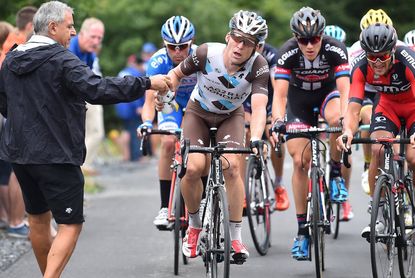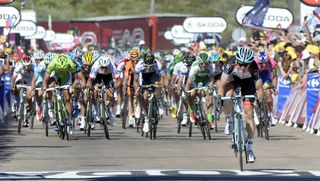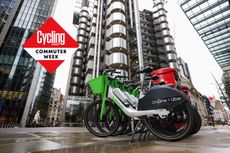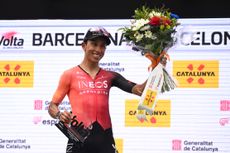What do pro cyclists eat before, during and after a Monument?
It is not just skill and strength that it required to get you through a Monument, a stringent nutrition strategy must also be followed. Jan Bakelants reveals how he stays fuelled for when it really matters

The five Monuments of cycling are some of the most gruelling racing days on the cycling calendar. With hundreds of kilometres ridden over the course of multiple hours on the bike, it can sometimes be tricky to fuel correctly for the challenge ahead, especially when combined with the racing at hand.
Andy Blow, founder of Precision Hydration, works with a number of pro riders focusing on how to hydrate for these mammoth riding days in the saddle.
“There’s been a bit of a debate recently on whether a traditional carb-based approach to fuelling is best or whether the increasingly popular Low Carb High Fat (LCHF) method is the way forward." Blow explains.
“At Precision Hydration, we’ve personalised the hydration strategies of a long list of elite athletes, including Team Ag2r La Mondiale’s Jan Bakelants.”
Bakelants had high hopes for Milan-San Remo and, although a podium finish evaded him in the end, he made the front bunch over the Poggio and finished 41st just five seconds behind the winner Michal Kwiatkowski from Team Sky.

The Ag2r rider explains his pre race diet before one of these monumental races:
The calm before the storm
Get The Leadout Newsletter
The latest race content, interviews, features, reviews and expert buying guides, direct to your inbox!
"The day before a race is all about carbo loading, we reduce the training volume in the days before the start.
This year I did Tirreno-Adriatico and I had three days to recover before Milan-San Remo. The day before Milan-San Remo we rode for three hours and after that I started to increase my carbohydrate intake in my meals.
I started with a breakfast of 60g of oats with yoghurt, six rice waffles with ham, a fruit salad and a cappuccino. During our easy ride we stopped at a bakery for a slice of crostata, a traditional Italian jam pie.
>>> Five pre-ride breakfasts for cyclists
For lunch we had a risotto and some boiled potatoes together with other boiled vegetables. In the afternoon I ate some Haribo candy and a banana and for dinner a plate of pasta (about 150g in dry weight) and some more potatoes with a small piece of chicken.
Race-day morning
On the day of the race I will get up and have my usual one day race breakfast; 50g of oats with yoghurt, 100g (dry weight) of rice. Lots of carbs because we'll need plenty of energy!
Depending on the hotel I’m staying in, I’ll also add some ham or ask for an omelette consisting of two yolks and three egg whites. The omelette fills me up and supplies me with some protein, it also goes well with the rice.
I do miss my own omelettes when I’m at a race though; at home we have our own chickens and the taste of our own eggs is unbeatable! If there’s space for more after all that, I’ll eat some rice cakes with some jam.
I always drink green tea at breakfast as it has proven health benefits and I prefer not to add to the nerves yet by drinking coffee!
Just before the race starts I’ll have a double espresso on the team bus. The caffeine gives me just the right kick to start the race.
Pretty much as soon as we start riding, I start eating. In the beginning this will be real foods that you need to chew on and that get absorbed rather slowly. A banana or two is one thing I always have in my back pocket for those first hours.
The soigneurs prepare little jam sandwiches, porridge and rice balls. I’ll always take these foods with me for the early going, after years as a pro you get tired of the taste of energy bars. Later in the race I will then switch to bars and only move on to gels in the final stages.
>>>Add a twist to your on-bike nutrition with fig and pistachio rice cakes (video)
The golden rule is to take in at least 60g of carbs every hour, but my stomach is well trained and I can get in more than that these days. In those 60g are some sugars, including those from the sports drink in our water bottles.
On hot days I always have a Precision Hydration 1,500mg/l to hand to keep up with the sweat loss of a six-hour race.
How times have changed
I rode in the team with Chris Horner in 2012 and 2013, who had a quite different approach to in-race fuelling. During the race he only ever wanted to eat snickers and drink Coca Cola! He would ask the guy that had to stay with him in the race "hey, can you get a snickers and a coke for me at the team car?”
Time to relax and replenish
When the race is over I’ll have a soft drink, a recovery shake and some rice or some other carb-rich food prepared by the bus driver.
At dinner if I have a choice I’ll tend to have a steak. The long effort I’ve put in during the day needs to be compensated with the right amount of protein and I love a good steak, especially as it goes well with a good glass of red wine (my favourite reward when it all went well)”
“It’s amazing how much Jan packs away and interesting how much of it is carbohydrate," adds Blow.
“That really aligns with our approach to fuelling. Now all you need is your own chickens and you'll have everything you need to eat like a pro.”
Andy Blow founded Precision Hydration to help athletes solve their hydration issues. He has a degree in Sport and Exercise Science and was once the Team Sports Scientist for Benetton and Renault F1 teams.
Want a free personalised hydration plan like Jan Bakelants? Precision Hydration have a free Cycling Sweat Test that gives you advice on things like how much to drink, when, all tailored to what you're training for.

Thank you for reading 20 articles this month* Join now for unlimited access
Enjoy your first month for just £1 / $1 / €1
*Read 5 free articles per month without a subscription

Join now for unlimited access
Try first month for just £1 / $1 / €1
Paul Knott is a fitness and features writer, who has also presented Cycling Weekly videos as well as contributing to the print magazine as well as online articles. In 2020 he published his first book, The Official Tour de France Road Cycling Training Guide (Welbeck), a guide designed to help readers improve their cycling performance via cherrypicking from the strategies adopted by the pros.
-
 Hire and hire: Bike rental schemes hit record numbers in the UK, almost topping 25 million rides
Hire and hire: Bike rental schemes hit record numbers in the UK, almost topping 25 million ridesAn average of 67,565 rides were taken a day between September 2022 and September 2023, an increase of 24%
By Adam Becket Published
-
 Egan Bernal says he has regained his pre-crash form, but others have improved
Egan Bernal says he has regained his pre-crash form, but others have improvedColombian, who suffered traumatic training accident in 2022, aiming for return to Tour de France
By James Shrubsall Published